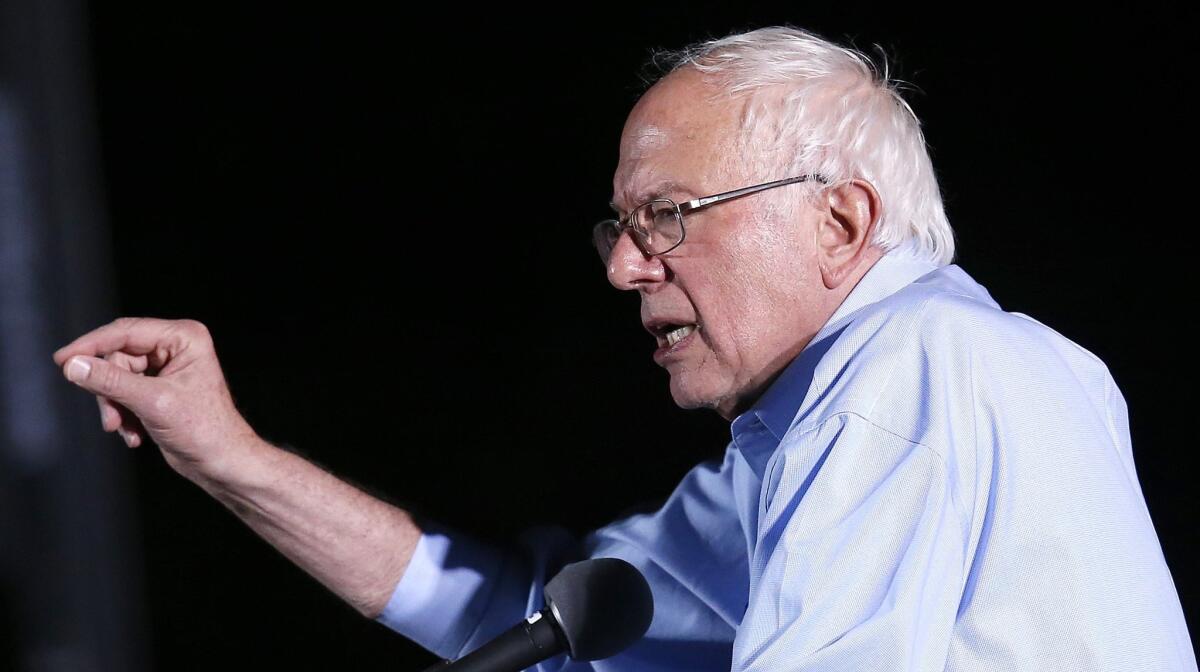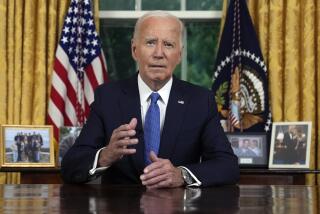Editorial: Bernie Sanders changed the Democratic Party for the better. Now it’s his job to help defeat Trump

Sen. Bernie Sanders’ decision to end his campaign for the Democratic presidential nomination was probably inevitable, given the string of victories former Vice President Joe Biden racked up after many of the other Democratic candidates rallied behind him. But Sanders deserves credit for announcing his decision now instead of dragging out the contest further.
Sanders also wisely recognized that the COVID-19 pandemic has made campaigning a risky distraction. On Wednesday he said that, because of the pandemic and President Trump’s failed response, “I cannot in good conscience continue to mount a campaign that cannot win and which would interfere with the important work required of all of us.” Sanders’ name will continue to appear on the ballots in subsequent contests, and Sanders delegates will try to push the party platform in a progressive direction. But in suspending his campaign, Sanders has taken an important step toward the unity the party will need to defeat Trump in November.
Sanders retires from the field having moved Democrats with his clarion call for efforts to redress income inequality and the needs of working Americans, even if it’s an exaggeration to boast, as he did on Wednesday, that his movement “has won the ideological struggle.” The COVID-19 pandemic has exposed inequalities in this society, reinforcing Sanders’ arguments and galvanizing even Republicans, including Trump, to join in stitching a stronger safety net for those made jobless by this crisis.
The pandemic also has shown how poorly the U.S. healthcare system performs under stress, underlining Sanders’ point that we need universal insurance coverage. In sharp contrast to 2016, every Democrat running for president this go-around backed the idea of universal coverage; the fight was over how to get there, and many Democrats (and The Times editorial board) balked at Sanders’ government-centric vision of “Medicare for all.”
Although Sanders’ campaign faltered in many states on and after Super Tuesday, he also scored several victories, most notably in California, where his emphasis on economic justice resonated in a state with a huge divide between haves and have-nots. The 78-year-old senator from Vermont can also take comfort in the fact that his message proved particularly compelling for younger voters whose preferences may prove decisive in future elections, a fact he cited in a message to his supporters.
What we hope Sanders doesn’t take from his failed candidacy — or communicate to his fervent followers — is a conviction that the process was rigged against him and that a conspiracy of party leaders and the “billionaire class” stymied his campaign. The truth is that, as an independent senator who viewed the Democratic Party as an instrument for his ambitions rather than a political home, Sanders faced resistance not just from benighted bigwigs but from ordinary Democratic voters, including older African Americans. Even some voters who might been attracted to Sanders’ message worried, reasonably, that he would be at a disadvantage in a general election contest with Trump, who would be sure to emphasize the “socialist” in “democratic socialist.”
Nor, as Sanders suggested, was there an “establishment” conspiracy to hurt his chances by pressing other candidates to drop out. Several of those former rivals, including Sen. Kamala Harris of California, endorsed Biden not because of a conspiracy but because they thought he would be the most formidable opponent for Trump and the most helpful to Democratic candidates further down the ballot. It’s also true that Sanders’ presence in the race probably contributed to the poor showing of other candidates whose views put them to the left of Biden, notably Sen. Elizabeth Warren of Massachusetts.
Biden also has his flaws as a candidate. This page has expressed concerns about his sharpness, his gaffes and his ability to stand up to Trump forcefully during a general election campaign, and we fear that his presence in the race cast too great a shadow over a new and less familiar generation of candidates with compelling ideas. But we also believe that it’s vital that voters bring to an end the incompetent and corrupt administration of Donald Trump. It is imperative that Sanders do a better job in 2020 leading his supporters to back Biden in November than he did in getting out the vote for Hillary Clinton in 2016. Because sadly, some in Sanders’ movement continue to flirt with the absurd and dangerous notion that Trump and Biden are interchangeable.
For his part, Biden must show Sanders’ supporters that he shares their goals for a more just, humane and equitable society, even if he differs on how to achieve them. He has started to do so, telling young Sanders supporters last month that “I hear you. I know what’s at stake. I know what we have to do.” That outreach will be crucial to his ability to form a coalition between mainstream voters and progressive Democrats that’s large enough to beat Trump.
The “revolution” Sanders promised had an appeal that Biden, the consummate political insider, will find it difficult to duplicate as he challenges Trump in the general election. That is why Sanders must do more than pay lip service to the imperative of ejecting Trump from the White House. He needs to persuade his followers to be part of the solution to the mess that Trump has created in this country. That means campaigning actively and enthusiastically for Biden, who is far more aligned with Sanders’ goals — and the public’s best interests — than the odious incumbent.
More to Read
A cure for the common opinion
Get thought-provoking perspectives with our weekly newsletter.
You may occasionally receive promotional content from the Los Angeles Times.










